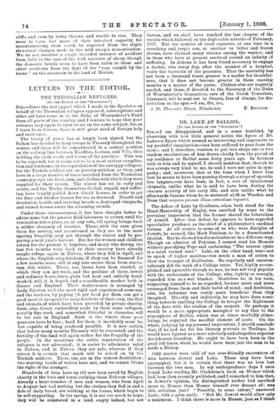LETTERS TO THE EDITOR.
THE THESSALIAN REFUGEES.
[TO THE EDITOR OF THE " SPECTATOR:]
SIR,—Since the last appeal which I made in the Spectator on behalf of the Thessalian refugees appeared, subscriptions and
other aid have come in to the Duke of Westminster's Fund from all parts of the country, and I venture to hope that your columns may again be open to me on the same subject, for, as I learn from Greece, there is still great need of foreign help and assistance.
The treaty of peace has at length been signed, but the Sultan has decided to keep troops in Thessaly throughout the winter, and these will be concentrated in a central position on the railway line between Karditsa, Larissa, and Volo, thus holding the main roads and towns of the province. This was to be expected, but it turns out to be a most serious complica- tion and hindrance lathe repatriation of the unhappy refugees, for the Turkish soldiers are as poverty-stricken as they, and have in a large number of cases snatched from the Thessalian country people the food, corn, and clothes with which they were supplied for their return. The winter has set in early and severe, and the Turks, themselves ill-clad, unpaid, and suffer- ing, have largely pulled down Greek houses, in order to get the door and window frames for use as firewood. Dearth and desolation, hostile and starving invade: s, destroyed vineyards, and ruined houses await the returning crowds.
Under these circumstances, it has been thought better to advise none but the poorest field-labourers to return until the evacuation takes place, or, at any rate, till spring brings back a milder clemency of weather. These, with the corn given them for sowing, and accustomed as they are to the most sparing frugality, may get through the winter and be pre- paring a next year's harvest. But for the women and children return for the present is hopeless, and many who during the last few months went back to their country have already sought refuge again in Eubcea, where they fled in April, and where the English soup-kitchens, if they can be financed for a few months more, will at any rate secure them from starva- tion this winter. There, too, looms have been started, at which they can get work, and the produce of these, towels and ordinary house-linen, plain but neat and entirely hand. worked, will, it is hoped, find a considerable market both in Greece and England. Their maintenance is managed by Lady Egerton with the most rigid and experienced economy, and the workers, by paying Id. per head per diem, can get a good meal at co-operative soup-kitchens of their own, the fuel and utensils of which have been provided by private charity. Soon, also, Greek embroidery made by these same refugees, notably fine work and somewhat Oriental in character, will be for sale in England. Such is the winter these poor peasants have to face ; hard for them it inevitably must be, but capable of being rendered possible. It is now certain that before many months Thessaly will be evacuated, and the fertility of the land will again suffice for the frugality of the people. In the meantime the entire repatriation of the refugees is not advocated ; it is easier to administer relief in Eubcea, and in Eubcea they are safe, whereas if they return it is certain that much will be seized on by the Turkish soldiers. These, too, are in the utmost destitution; two starving bands of wolves have met, and we cannot blame the right of the stronger.
Hundreds of lives have up till now been saved by English charity in the huts and tents outlying these Eubcean villages. Already a large number of men and women, who from April to August last had nothing but the clothes they fled in and a dole of daily bread, are working at the looms, which begin to be self-supporting. In the spring, it is not too much to hope, they will be reinstated in a land, empty indeed, but not
barren, and we shall have reached the last chapter of the results which followed on the deplorable mistake of February, 1897. But the months of cruel exposure, at one time to a scorching and tropic sun, at another to bitter and frozen storms, have claimed many victims among the weaker, and in those who have at present survived caused an infinity of suffering. In Athens it has been found necessary to engage a doctor, who every day, after the manner of a hospital, visits the barracks of the peasants. That the mortality has not been a thousand times greater is a matter for thankful- ness, that it does not become greater in these ensuing months is a matter of the purse. Clothes also are urgently needed, and these, if directed to the Secretary of the Duke of Westminster's Committee, care of the Greek Consulate, Liverpool, will be sent out to Greece, free of charge, for dis- tribution on the spot.—I am, Sir, &c., 9 St. Thomas's Street, Winchester. F. BENSON.










































 Previous page
Previous page